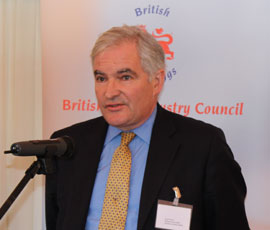Lord Henley calls for evidence on eggs

Parliamentary under-secretary at DEFRA, Lord Henley, has called on the British egg industry to provide the government with evidence on how other countries are performing in relation to the conventional cage ban.
Addressing a British Egg Industry Council reception at the House of Lords on Monday (4 July) Lord Henley said it was essential that UK producers were able to operate on a level playing field when the new welfare legislation takes effect.
“I can assure you we will keep up the pressure on the European Commission to find a universal solution (to the threat of imports of illegal eggs),” he said.
But the government needed help from the industry as part of the “evidential effort” on how producers in other countries were performing.
Lord Henley acknowledged that the egg sector was under huge financial pressure as a result of falling egg prices and rising feed costs. These magnified the challenges posed by the change in welfare legislation “in spades”.
But he added that egg producers needed to be patient as government worked to find a solution. “You get the chicken by hatching the egg, not by smashing it,” he said.
BEIC chief executive Mark Williams told the meeting that latest estimates suggested that 23% of EU laying hens would still be in conventional cages after 1 January 2012, producing 70 million eggs a day. “That is more than double the total UK production. It is a huge amount of illegality.”
But the EU commission was still being “ostrich like”, and was insisting that it was up to member states to enforce the conventional cage ban. This lax attitude meant the UK was extremely vulnerable to illegal egg imports, especially given that it was only 80% self-sufficient.
British egg producers did not fear fair competition, Mr Williams said, but illegal eggs would have an 8% cost advantage and that was not fair.
The EU commission was not expected to come forward with any proposals on how to stop the trade in illegal eggs until next spring at the earliest, he added. In the absence of any EU action, the UK government need to put in place measures “to stop our industry from being undermined”.
